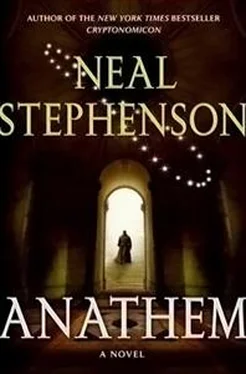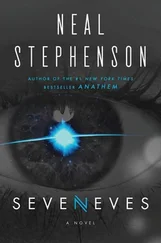“Places like this don’t have suvins,” I reminded him. “They have stabils.”
“Oh yes. That comes from—it’s an old Fluccish word—uh, cultural…”
“Stabilization Centers. But don’t say that because no one has called them that in something like three thousand years.”
“Right. Stabils it is.”
We turned where the coaches turned. For the next minute or so, things were fragile between us. Inside the math, it didn’t matter that he had come from burgers and I had come from slines. But as soon as we had stepped out of the Decade Gate, this fact had been released, like a bubble of swamp gas deep in dark water. Invisibly it had been rising and expanding ever since, and had just now erupted in a great, flaming, stinking belch.
My old stabil looked, in my eyes, like a half-scale reproduction of itself thrown together by a sloppy modelmaker. Some of the rooms had been boarded up. In my day they’d been crowded. So that confirmed that the population was declining. Perhaps by the time I was a grandfraa there would be a young forest here.
An empty coach pulled out of the drive. Before the next drew up to take its place, I glimpsed a crowd of youngsters staggering under huge backpacks into a canyon of raucously colored light: a breezeway lined with machines dispensing snacks, drinks, and attention-getting noises. From there they would carry their breakfasts into rooms, which Jesry and I could see through windows: in some, the children all watched the same program on a single large screen, in others each had his or her own panel. To one end, the blank wall of the gymnasium was booming with low-frequency rhythms of a sports program. I recognized the beat. It was the same one they had used when I was there.
Jesry and I had not seen moving pictures in ten years and so we stood there for a few minutes, hypnotized. But I had got my bearings now, and once I had nudged Jesry back into motion, I was able to lead us down the streets I had wandered as a boy. People here were as keen to modify their houses as their vehicles, and so when I did recognize a dwelling, it would have a new, freestanding roof lofted above the old one, or new modules plugged and pasted onto the ones I saw when I dreamed about the place. But I was helped by the fact that the neighborhood was half the size of what I remembered.
We found where I’d lived before I was Collected: two shelter modules joined into an L, another L of wire mesh completing a weedy cloister that housed one dead mobe and two dead fetches, the oldest of which I had personally helped set up on blocks. The gate was decorated with four different signs of varying ages promising to kill anyone who entered, which, to me, seemed much less intimidating than a single sign would’ve. A baby tree, about as long as my forearm, had sprouted from a clogged raingutter. Its seed must have been carried there by wind or a bird. I wondered how long it would take to grow to a size where it would tear the gutter clean off. Inside, a loud moving picture was showing on a speely, so we had to do a lot of hallooing and gate-rattling before someone emerged: a woman of about twenty. She’d have been a Big Girl to me when I’d been eight. I tried to remember the Big Girl’s names.
“Leeya?”
“She moved away when those guys left,” the woman explained, as if hooded men came to her door every day incanting the names of long-lost relations. She glanced back over her shoulder to watch a fiery explosion on the speely. As the sound of the explosion died away we could hear a man’s voice demanding something. She explained to him what she was doing. He didn’t quite follow her explanation, so she repeated the same words more loudly.
“I infer that some kind of factional schism has taken place within your family while you were gone,” Jesry said. I wanted to slug him. But when I looked at his face I saw he wasn’t trying to be clever.
The woman turned to look at us again. I was peering at her through an aperture between two signs that were threatening to kill me, and I wasn’t certain that she could see my face.
“I used to be named Vit,” I said.
“The boy who went to the clock. I remember you. How’s it going?”
“Fine. How are you?”
“Keeping it casual. Your mama isn’t here. She moved.”
“Far away?”
She rolled her eyes, vexed that I had leaned on her to make such a judgment. “Farther than you can probably walk.” The man inside yelled again. She was obliged to turn her back on us again and summarize her activities.
“Apparently she does not subscribe to the Dravicular Iconography,” Jesry said.
“How do you figure?”
“She said you went to the clock. Voluntarily. Not that you were taken by or abducted by the avout.”
The woman turned to face us again.
“I had an older sib named Cord,” I said. I nodded at the oldest of the broken fetches. “Former owner of that. I helped put it there.”
The woman had complex opinions of Cord, which she let us know by causing several emotions to ripple across her face. She ended by exhaling sharply, dropping her shoulders, setting her chin, and putting on a smile that I guessed was meant to be obviously fake. “Cord works all the time on stuff.”
“What kind of stuff?”
This question was even more exasperating to her than my earlier “Far away?” She looked pointedly at the moving picture.
“Where should I look?” I tried.
She shrugged. “You passed it on the way probably.” And she mentioned a place that we had in fact passed, shortly after leaving the Decade Gate. Then she took a step back inside, because the man in there was demanding an account of her recent doings. “Keep it casual,” she said, and waved, and disappeared from our view.
“Now I really want to meet Cord,” Jesry said.
“Me too. Let’s get out of here,” I said, and turned my back on the place—probably for the last time, as I didn’t imagine I’d come back at next Apert. Perhaps when I was seventy-eight years old. Reforestation was a surprisingly quick process.
“What’s a sib? Why do you use that word?”
“In some families, it’s not entirely clear how people are related.”
We walked faster and talked less, and got back across the bridge in very little time. Since the place where Cord worked was so close to the concent, we first went up into the burger neighborhood and found Jesry’s house.
When we’d gone out the Decade Gate, Jesry had been quiet and distracted for a few minutes before he had gone on his rant. Now I had an upsight, which was that he’d been expecting his family to be standing in front of the gate to meet him. So as we approached his old house I actually felt more anxious than I had when approaching mine. A porter let us in at the front gate and we kicked off our sandals so that the damp grass would clean and soothe our blasted feet. As we passed into the deep shade of the forested belt around the main residence, we threw back our hoods and slowed to enjoy the cool air.
No one was home except for a female servant whose Fluccish was difficult for us to make out. She seemed to expect us; she handed us a leaf, not from a leaf-tree such as we grew in the concent, but made by a machine. It seemed like an official document that had been stamped out on a press or generated by a syntactic device. At its head was yesterday’s date. But it was actually a personal note written to Jesry by his mother, using a machine to generate the neat rows of letters. She had written it in Orth with only a few errors (she didn’t understand how to use the subjunctive). It used terms with which we were not familiar, but the gist seemed to be that Jesry’s father had been doing a lot of work, far away, for some entity that was difficult to explain. But from the part of the world it was in, we knew it had to be some organ of the Sæcular Power. Yesterday, she had with great reluctance and some tears gone to join him, because his career depended on her attending some kind of social event that was also difficult to explain. They had every intention of making it back for the banquet on Tenth Night, and they were bending every effort to round up Jesry’s three older brothers and two older sisters as well. In the meantime, she had baked him some cookies (which we already knew since the female servant had brought them out to us).
Читать дальше





